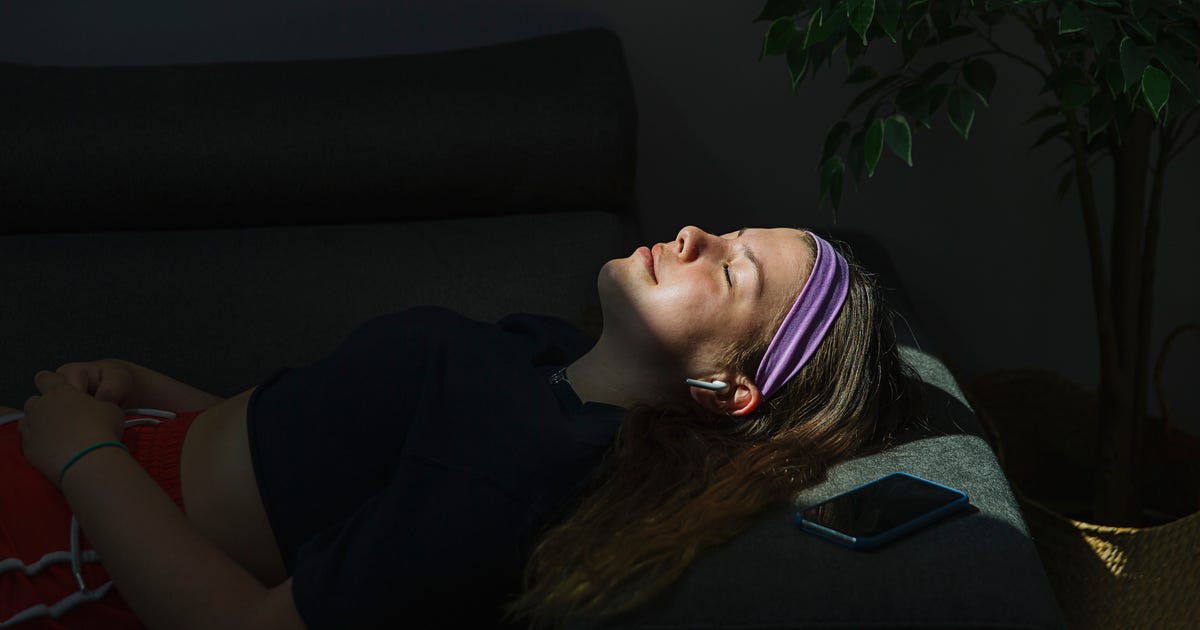
Listening to sleep music soothing sounds before bed is one of the best ways to be lulled into a slumber. There’s solid proof that listening to relaxing music before bed can be beneficial, but it’s important you go about it the right way. The trick is to add soothing sounds, like calming instrumentals or songs and sounds that make you feel relaxed. Pro tip: The songs you have on your party or hype-up playlists unfortunately do not have a place in your sleep playlist.
Instead, here are the best kinds of sleep music and sounds for your bedtime playlist, and an explanation of the science behind listening to music before you go to sleep.
For even more help sleeping at night, pair listening to music with prebedtime yoga or these six natural sleep aids.
Read more: Best Mattress of 2022
Music is a good alternative to watching tv

Many of us have our phones attached to our hips these days and pass time binge-watching our favorite shows. It’s easier said than done, but it’s beneficial to avoid your devices an hour to an hour and a half before bed to help promote better sleep. There are a few reasons why.
Blue light emits from tech devices like phones, laptops and TVs, but it has a negative effect on sleep latency (the amount of time it takes to fall asleep). The body’s circadian rhythm, or internal clock, is influenced by outside signals like light and darkness. The blue light signals it’s not yet bedtime, which limits the body’s natural melatonin production.
Music is a good alternative to watching TV or YouTube videos because it helps distract and soothe you to sleep without requiring you to open your eyes and watch.
Read more: How Learning Your Chronotype Can Help You Get Better Sleep
Why music and sounds can help you sleep
As you might know from experience, music has the power to influence different feelings and emotions as you listen. According to the National Library of Medicine, one study showed that music boosted oxytocin levels and feelings of relaxation. Listening to soothing seems to have a relaxing effect on the body, helping make it easier to fall asleep.
The type of music you listen to does make a difference, and the best results seem to stem from classical music, instrumentals and rhythms with 60 beats per minute. Not coincidentally, as you begin to fall into the beginning sleep stages, your heart rate drops to around 60 beats per minute. Listening to music at the same tempo can, in its own way, promote sleepiness.
8 tips for making a good sleep playlist
Now that we know the impact music has on our sleep, let’s get into how to create the perfect sleep playlist for you.
1. Sleep with slow jams
Whatever songs or instrumentals you decide to add to your music playlist, make sure they’re slow. The best songs to dance and head-bang to should be avoided at all costs. Songs with piano, harp, violin and soft drums can help do the trick.
2. Enjoy the music you add to your list
While classical music can help you fall asleep, as the NIM stated, personal preference is also important in picking out the perfect sleep playlist songs. If classical music isn’t your jam, consider other slow songs or artists you already like to listen to. You can also do some exploring for new music by checking out your music provider’s curated sleep playlists (Apple Music, Spotify, Prime Music) or what other people have on their own sleep playlists.
3. Listen to a song in its entirety before adding
Try not to include songs you’ve never listened to before. Test a song before adding it to see if it’s fitting for you and sleep. Many songs have tempo changes, and you want to make sure there aren’t any surprise guitar riffs that might wake you up. You generally want to feel relaxed when listening to a song for your playlist, so leave it out if it doesn’t do the trick.

Andrea Piacquadio/Pexels
4. Try a song in another language
You don’t know what the singer is saying, but that’s the point. Listening to calming music in a different language can help keep you feeling relaxed and distracted from intrusive thoughts, without the possibility of lyrics making you feel negatively.
5. Consider ASMR and other soothing sounds
Music isn’t the only sound that can promote better sleep. You can also try listening to ASMR or soothing sounds like ocean waves crashing or nature noises. ASMR stands for autonomous sensory meridian response, and it’s a sensation resulting from particular soft sounds that trigger a tingly sensation or feelings of relaxation. You can find plenty of ASMRtists and their playlists or pre-curated nature playlists on popular music streaming services.
6. Opt for 432Hz music
If you’re having trouble picking out songs that help you relax, consider a 432Hz playlist. A 2019 study revealed that listening to 432Hz music can help you relax and promote better sleep quality. The same study concluded that listening to this type of music may decrease sleep latency and can produce a significant calming effect.
7. Use sleep headphones
You can use a speaker on your device to listen to your sleep playlist or headphones. However, some headphones are too bulky and uncomfortable to wear during sleep. This list of the best headphones for sleep proved to get the job done without waking us up in the middle of the night.
8. Use a sleep timer
Some apps allow you to set a sleep timer that stops playing your music after a set amount of time. While soft music is beneficial for sleep, you may not want it playing on a loop for all hours of the night. Spotify has launched a sleep timer with directions on how to set it, as has Amazon Music, and you can create a makeshift sleep timer for Apple Music following these tips.
You don’t have to settle for poor sleep. Learn how to make the most out of your sleep, or follow these steps to help you fall asleep in 10 minutes or less.
The information contained in this article is for educational and informational purposes only and is not intended as health or medical advice. Always consult a physician or other qualified health provider regarding any questions you may have about a medical condition or health objectives.
